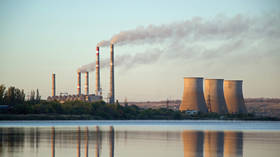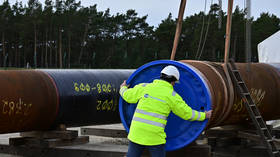US firms profiting from aid to Ukraine revealed

A bill that could hand Ukraine $500 million in economic aid, currently on a fast track through the US legislature, could offer major opportunities for American energy companies, who will be granted new leeway to build infrastructure in eastern Europe.
Writing for the American magazine The New Republic this week, journalist Kate Aronoff argued that, in addition to massively boosting US military assistance to Kiev, the “Defending Ukraine Sovereignty Act of 2022,” introduced by Democrats earlier this month, also includes language that could allow energy firms to expand into parts of Europe that currently buy most of their gas from Russia.
The bill directs the White House to issue sanctions on a number of Russian entities, including energy producers, if the president finds that Moscow has engaged in a “significant escalation in hostilities” to disrupt Ukrainian sovereignty. It also cites “mutually beneficial opportunities for increased investment and economic expansion between the United States and the Baltic states,” as well as “support for the Baltic region’s physical and energy security needs.”
An anonymous Democratic staffer on the Senate Foreign Relations Committee told Aronoff that these measures were meant to combat “Chinese economic coercion in Lithuania,” and added, “US support for making any country less dependent on Russian energy resources, especially former Soviet bloc countries, is in fact in our national security interest.”
The staffer said that no fossil fuel companies were consulted when the legislation was drafted. Aronoff pointed out, however, that industry executives have been speaking publicly about the potential for US reach into the European market if Russia loses ground.
Asked by CNN whether there were alternatives to Russian gas in Europe, the CEO of gas firm EQT replied, “Yeah absolutely, it’s the United States. And the United States LNG [liquefied natural gas] industry powered by American shale is a solution that could prevent this type of crisis that we’re seeing over there in Europe from happening.”
Washington and the EU have discussed implementing massive sanctions in the event of a Russian invasion of Ukraine, but some in Europe fear that measures targeting Moscow’s gas sector would bring about an energy crisis for the EU, which currently imports 41% of its gas from Russia. The Kremlin has denied it has any aggressive intentions in the region, and has accused NATO of inflaming the situation.













